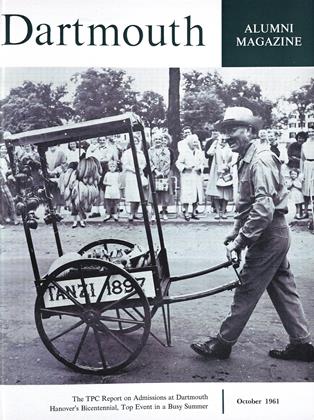By A. J.Liebling '24. New York: Simon andSchuster, 1961. 252 pp. $3.95.
It must always be a temptation to a reviewer of one of Mr. Liebling's books to try to write as colorfully and as vividly as he does. The temptation should be resisted, as shown by several past reviews by those who succumbed to the lure. Few of us have the shrewdness of observation and the retentive memory, combined with the interest in food, drink, horse racing, and prize fighting, that are needed to produce the Liebling prose, decorated by similes as colorful as a Dead Diamond squaretail.
In this latest task Mr. Liebling is covering a stream he doesn't know very well, and does all right. Like many of us Yankees, he was surprised to find so many good places to eat in New Orleans - even the hotel coffee shops have the flair - and to turn up so much political chicanery south of Jersey City. (Rural touches like this always surprise the city slicker, but even in New Hampshire there are those who could instruct Tammany.) Somehow in much of all this he finds a resemblance to the Arab way of life; possibly it is so.
Like many of us, again, he went to Louisiana well conditioned against all Longs and found them not entirely bad. His reaction was to look at Earl as a Southern white hope, in spite of the fact that even in a Vermont hill town he would have been regarded as a character and even in Ward Eight as a politician of doubtful probity.
The story starts with Governor Earl Long off to a mental hospital and ends fifteen months later, after his unsuccessful attempt to retain his post, his successful campaign for the Congress, and his death. It is full of vivid pictures, of shrewd comments on the campaigns and on political life in Louisiana. Many of the best comments are made in passing, as on the influence of oil, the real worth of Huey Long, and the negro vote.
Sometime all this should be developed; there is real need for a full study of the Longs, and this book is not that, of course. It is intensely interesting, a pleasure to read, and it tells all that most of us need to know. Those who like politics - who doesn't? - must read it.
Mr. Liebling points out that for a filing fee of $210 anyone may run for governor in Louisiana, and adds wistfully that he knows nowhere else where a man can have so much fun for the money. He might like to know, as a Dartmouth alumnus, that he could come back to New Hampshire and have just as much for $100.
 View Full Issue
View Full Issue
More From This Issue
-
 Feature
Feature... AND MANY DARTMOUTH YESTERDAYS
October 1961 By Edward Connery Lathem '51 -
 Feature
FeatureWHY a Hopkins Center at Dartmouth?
October 1961 -
 Feature
FeatureWHAT OF ADMISSIONS AT DARTMOUTH?
October 1961 -
 Feature
FeatureADMISSIONS – As Seen at the President's Desk
October 1961 By J.S.D. -
 Feature
FeatureIt Was Summer, Yes, But Quiet... NO
October 1961 -
 Article
ArticleTHE FACULTY
October 1961 By GEORGE O'CONNELL
HERBERT W. HILL
-
 Letters to the Editor
Letters to the EditorLetters
February 1940 -
 Article
ArticleTHE U. N. RECORD
April 1954 By HERBERT W. HILL -
 Feature
FeatureThe 1955 Hanover Holiday Program
April 1955 By HERBERT W. HILL -
 Books
BooksDEMOCRACY IN THE CONNECTICUT FRONTIER TOWN OF KENT.
October 1961 By HERBERT W. HILL -
 Books
BooksMITRE AND SCEPTRE.
MARCH 1963 By HERBERT W. HILL -
 Books
BooksCOUNT RUMFORD: PHYSICIST EXTRAORDINARY.
APRIL 1963 By HERBERT W. HILL
Books
-
 Books
Books"The Horopter and Corresponding Retinal Points"
December 1932 -
 Books
BooksShelf Life
May/June 2004 -
 Books
BooksCHAUCERIAN ESSAYS.
February 1953 By HEWETTE E. JOYCE -
 Books
BooksPRACTICAL FLIGHT TRAINING
November 1936 By Ramon Guthrie -
 Books
BooksINTERNAL STRUCTURE OF GRANITIC PEGMATITES.
December 1949 By Richard E. Stoiber '32 -
 Books
BooksPROBLEMS ARISING FROM THE HISTORIC NORTHEASTERN POSITION OF THE IROQUOIS
January 1941 By Robert McKennan '25


